Who dominates UK film distribution?

It is becoming ever easier to make a feature film, thanks in large part to new technology which is cheaper and more accessible. We are currently in a boom for feature film production, with more films made in the UK last year than ever before. However, the size of movie audiences and the rate at which we watch films is not growing at the same speed. This means the 'pressure point' in the filmmaking process has shifted from "Will I get it made?" to "Will anyone see it?" I'm going to spend some time over the next few months looking at the situation UK filmmakers face when trying to get their film sold and seen by audiences. First up, let's take a look at who is actually distributing feature films in the UK. In summary...
There were 698 films released in cinemas in the UK and Ireland in 2013
The number of film and video distributors has increased by 32% since 1996
In 2013, there were 470 companies focused on video and film distribution in the UK, only 127 of whom actually released a film in UK cinemas that year
The top 10 distributors account for 97% of the box office revenue
Just three companies (StudioCanal, eOne and Entertainment) control half of all box office income made on UK independent films.
More films in cinemas than ever before
The number of films being released in the UK and Ireland has doubled in the past 15 years. Last year, there were almost 700 films shown in cinemas in the UK and Republic of Ireland.
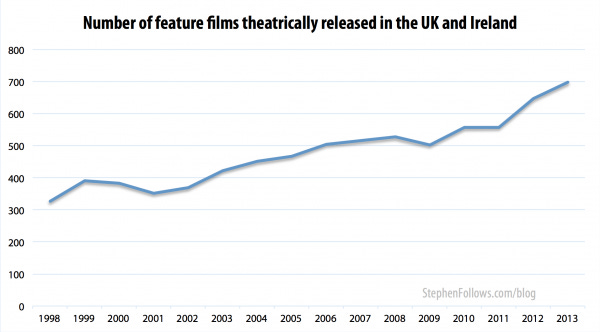
And more film distribution companies, too
Between 1996 and 2013, the number of companies engaged in 'film and video distribution' increased by 32%.
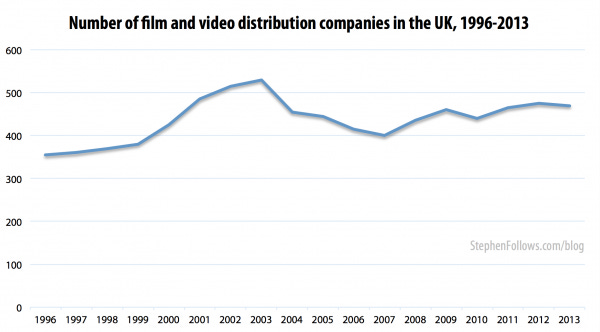
These figures come from the Office for National Statistics and so they are calculated using a slightly different method to the other data in this article. It mixes film and video distributors, whereas the other charts relate only to cinema film distribution. Also, some of these companies will be 'active' as far as the Office of National Statistics is concerned but may not have distributed a film in the past year. This means that the ONS 2013 figure of 470 film and video distributors is a lot larger than the BFI's figure of 127 companies who actually distributed a film in cinemas in 2013.
Great, so the market is opening up?
Nope. In 2013, the top 10 distributors controlled 96.5% of all the box office revenue. And despite the increase in the number of films on offer in cinemas, this has barely changed in the past 16 years.
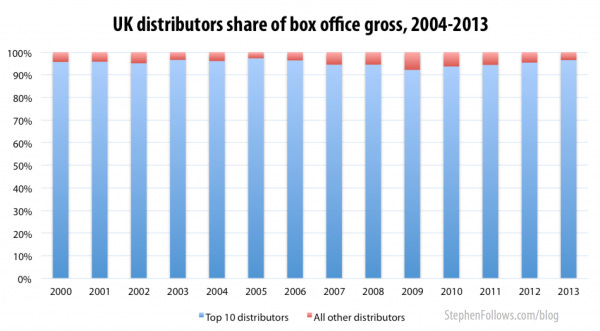
Who are the biggest players?
Unsurprisingly, the major Hollywood studios dominate the film distribution business.
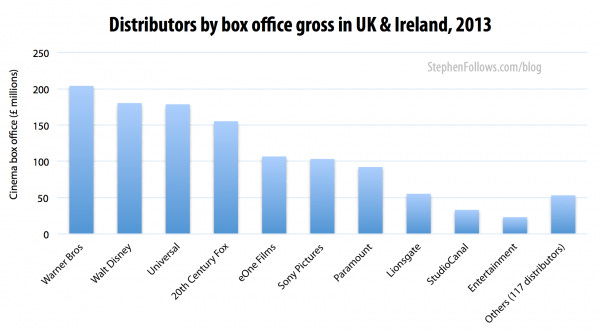
However, under the surface we can see that who's on top changes most years.
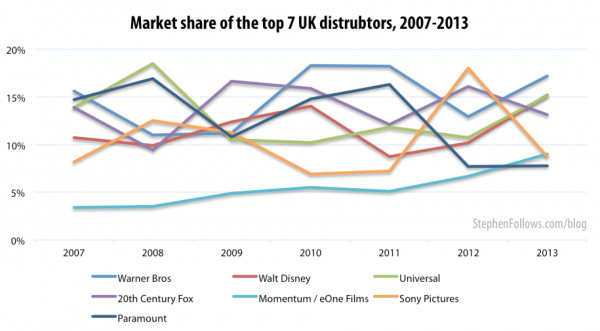
Interestingly, the spike in 2012 for Sony is almost exclusively due to the most recent instalment of the Bond franchise. 'Skyfall' is the highest grossing film at the UK box office between 1989 and 2013, grossing £103 million.
Who's on top for UK independent films?
When we strip away the studio-backed films we see a very different scene. Together eOne, Entertainment and StudioCanal account for half of the box office generated by UK independent films.
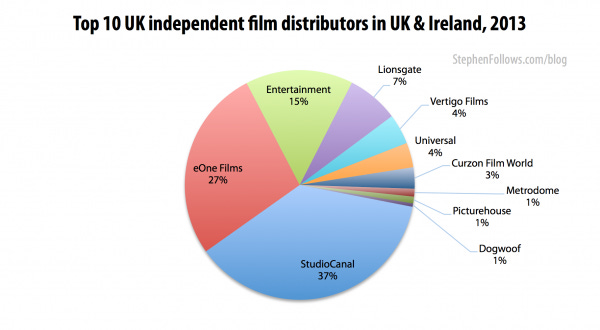
These figures include distributors releasing two or more UK independent films in 2013. Artificial Eye Film Releasing was re-branded as Curzon Film World in April 2013.
Epilogue
The data for today's work came from Rentrak, the Office for National Statistics and the BFI's Research Unit. Last time, I launched my 'Gender in Film Crews' report. It took over page 3 of The Guardian ("Phoar, look at the stats on that!") and was covered in publications ranging from The Mirror to the New Statesmen. I particularly enjoyed the angle some took of "British producer calls for more women". Before publication, I felt the data was new and different but I wasn't quite ready for the reaction. There was a mix of good journalism, campaigning commentary and a healthy dose of bat-shit-crazy. While the vast majority of reporting was positive and I was impressed with the breadth of the coverage, the report did provoke some interesting countervailing views, the epicentre of which seemed to be The Guardian comments section...

There were a number of comments which implied that the status quo has to be correct based on the fact that it was the status quo.

and...

We gained some valuable insights into the female mind...

But the most appropriate one to end on surely has to be...



